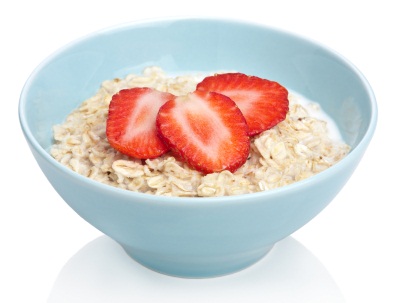Porridge love it or hate it, it’s here to stay..

I have to admit I was never a big fan of porridge oats. Whether it was the texture as a child that I never grew accustomed to, the taste which I found extremely bland or the actual look of it in the bowl that put me off, I will never figure out. Porridge was served in our house but it seems that my parents were the ones who only ever ate it. Porridge it seems divides people; they either love it or hate it.
Having studied nutrition I am well aware of the benefits of a daily intake of oats so as one of my New Year resolutions porridge is on the breakfast menu. I am fortunate that the porridge prepared by the canteen in work is at a consistency that is perfect and this has helped me a long way towards looking at it as a breakfast option. I have varied the look of it with a different selection of fruit on it on everyday. For instance today I had a medley of finely chopped apple, pear, blueberries and a few grapes and I have to say it was far from a chore to eat. However I have to admit I still could not eat it on its own. My skill in getting it to the right consistency so I can eat it on weekends is still unfortunately a work in progress.
So why should we eat porridge?
Improves functioning of the bowel
Oats contain soluble and insoluble fibre. Dietary fibre helps to improve bowel function by softening and increasing the bulk of the stool. A bulky stool is easier to pass which decrease the chance of constipation.1
Controls blood sugar levels
In people with diabetes soluble fibre can slow down the absorption of sugar and improve blood sugar levels.
Oats help prevent heart disease
A study published in the Archives of Internal Medicine showed that eating oats prevents heart disease. 10,000 Americans participated in this study and were followed for 19 years. The study revealed that people eating 21 grammes of fibre a day had 12% less coronary heart disease and 11% less cardiovascular disease than those only eating 5 grammes daily.2
Oats lower cholesterol levels
Cholesterol is a waxy like substance (lipid fat) produced by the liver. Cholesterol is vital for the body to function properly and produce hormones. However, having cholesterol levels that are too high is a risk factor for increasing the chance of having a heart attack.
Total Cholesterol levels should be no greater than 5 mmol/l. In the UK this level has now changed to no greater than 4.2 mmol/l.
HDL cholesterol which is good cholesterol should be greater than 1 mmol/l.
LDL cholesterol which is bad cholesterol should not be greater than 3 mmol/l.3
High fibre foods help in keeping weight stable
Porridge keeps you fuller for longer so you are less likely to overeat.
Warning: If you have not been eating much fibre it is always wise to increase fibre slowly as adding too much fibre can cause bloating and cramping. Allow your system to adjust to the change.
These are only a fraction of the benefits of porridge. Tomorrow I will have porridge with chopped banana.
References:
- Mayo Clinic; Dietary Fibre, Essential for a Healthy Diet; November 2009.
- Bazzano LA, He J, Ogden LG, Loria CM, Whelton PK. Dietary fiber intake and reduced risk of coronary heart disease in US men and women: the National Health and Nutrition Examination Survey I Epidemiologic Follow-up Study. Arch Intern Med. 2003 Sep 8;163(16):1897-904. 2003.
- Irish Heart Foundation, Cholesterol, 2012.
')}
No Comments
Sorry, the comment form is closed at this time.

Categories
- Blog (2)
- Events (1)
- Healthy Eating (6)
- News (10)
- Research (5)
Latest Posts
- De-stress and cope with stress
- Stress test – quick and easy way of finding out how stressed you are
- Bloating
- The link between acne and diet
- Kiwi & Apple Smoothie – so easy to make
Archive
- February 2023 (1)
- February 2014 (1)
- June 2013 (1)
- April 2013 (1)
- March 2013 (1)
- January 2013 (8)



